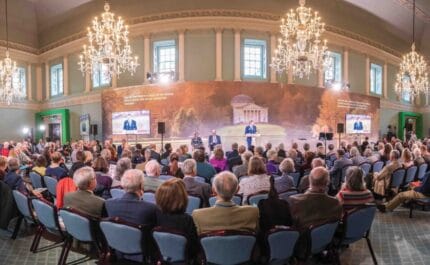Slowly does it: Nihal Arthanayake
In the second in our series of interviews on the benefits of slowing down we speak to the BBC's Nihal Arthanayake about how to have better conversations

In the second in our series of interviews on the benefits of slowing down we speak to Nihal Arthanayake, BBC Radio 5 Live presenter and author of LetŌĆÖs Talk, a book about how to have better conversations. LetŌĆÖs Talk looks at how conversation works, from Socratic dialogue to social media, and marshals interviews with investigative journalists, police negotiators, clinical psychologists and business tycoons to show how we can be more productive, open minded and impactful in our interactions.
For the first part in this series, an interview with Delayed Gratification editorial director Rob Orchard, click here
In LetŌĆÖs Talk you write about the benefits of slowing down and disconnecting from online distractions when having conversations. From your experiences on your BBC Radio 5 Live show, do you think that slowing down can result in better journalism?
The churn of news is a problem. We are bombarded by information and we donŌĆÖt take the time to step back and think about how much of this we are genuinely processing. Is it helping us understand the world around us? When I listen to a podcast with two authoritative people having a conversation, I begin to understand the topic. I begin to have my own questions and my own orthodoxies are challenged. IŌĆÖve got 12 hours of live radio to fill each week, so IŌĆÖm lucky to have enough time to give space for people to explore topics ŌĆō itŌĆÖs not like Talk TV or GBeebies [GB News], the kind of gladiatorial journalism where you pitch one person off against another just to get clicks and make people angry. A debate should be where both sides are willing to have their orthodoxies and ideas challenged, and potentially changed. Unfortunately we find ourselves in an age where thatŌĆÖs rare.
Is this the fault of social media, where one is rewarded for more confrontational views?
I think it is too easy to blame the wall for the graffiti on it. I think that politicians have a lot to answer for ŌĆō the Trump playbook, for example ŌĆō┬Āwhile states like Russia have made a concerted effort to sow chaos and discord. When you play with an ŌĆśus versus themŌĆÖ to get votes youŌĆÖre playing a dangerous game. Social media algorithms may corral us into certain ways of thinking, but itŌĆÖs humans ŌĆō┬Ānot computers, not social media giants ŌĆō┬Āwho are messaging in such a way as to cause division.
But isnŌĆÖt the power of the mob multiplied by social media?
Sure, but social media didn’t kill Stephen Lawrence, it didnŌĆÖt bring about Nazism or lead to the genocide in Rwanda. Humans were just as capable of gathering a mob before Twitter. Social media can amplify this stuff, but it can also create a fact-based narrative that undermines it, like when Greta Thunberg recently mocked Andrew Tate and annihilated him. She ended up getting more amplification than his original tweet did. So let’s not always think that everything is negative. While I do get some racism from bigots, my experience of social media is overwhelmingly positive.
You write in your book about the importance of being a good listenerŌĆ”
My book is called LetŌĆÖs Talk but it could have been called LetŌĆÖs Listen because all the great conversationalists I mention are great listeners. ThatŌĆÖs what they all have in common. The Chinese symbol for listening, ŌĆśtingŌĆÖ, is split into four quadrants and each represents a vital part of listening. ThereŌĆÖs your ears and your eyes, verbal and nonverbal cues, and then thereŌĆÖs also your heart and your soul. You should listen with all these elements. Empathy, experience, interest, focus. Put your phone away. You canŌĆÖt fully listen if your eyes are darting around towards whatever update youŌĆÖve just received.
How can we encourage younger generations to be good listeners?
What can you do other than to encourage them to recognize the beauty of conversation, eye to eye? How you behave in front of them is important, of course. If youŌĆÖre constantly on your phone, theyŌĆÖre going to absorb it, of course. IŌĆÖm addicted to my phone, I know that. IŌĆÖm at war with it. IŌĆÖm trying to find ways to extricate myself from it. When IŌĆÖm able to switch off my phone I feel so much better for it. Phones are designed to monetise your eyeballs. They’re not innocent bits of tech. They’re designed for you to spend as much time on them as possible.
Do we need to get back to the old coffee house etiquette you mention in your book?
ThereŌĆÖs something in that. In the 18th century coffee houses of London, conversation was to be respectful and you were encouraged to disagree politely: one of the fashions of the time alongside coffee was politeness. It was the height of bad form to be rude ŌĆō but you were also supposed to be challenged.
LetŌĆÖs Talk is published by Trapeze, priced at ┬Ż16.99
Slow Journalism in your inbox, plus infographics, offers and more: sign up for the free DG newsletter. Sign me up
Thanks for signing up.








